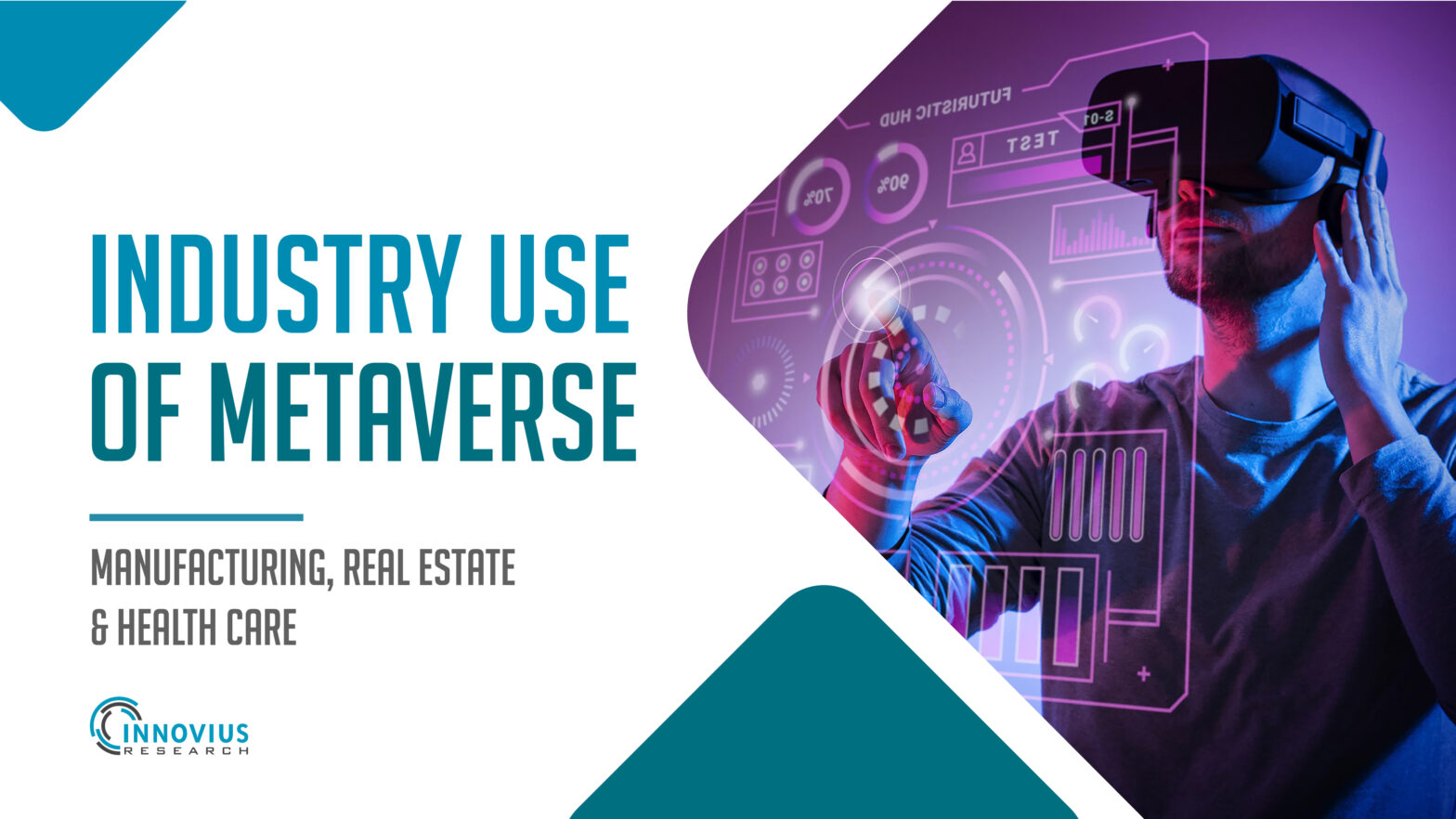
Use of Metaverse in Manufacturing, Real Estate & Healthcare
The World Of Virtual Reality- ‘Metaverse’ has an influence on nine different businesses. Previously, we have covered the Use of Metaverse in Gaming, E-Commerce & Interior Designing. We are here to unveil the next 3 to you. There is more to enlighten about in future postings.
Manufacturing
Through the integration of the Internet of Things (IoT), Artificial Intelligence (AI), and Mixed Reality, the Metaverse in Manufacturing industries will enable the creation of digital twins of places, processes, and real–world objects, allowing organizations to effectively monitor, analyze, and interact with their complex systems in real-time.
Rapid developments in manufacturing have increased the complexity of design and development processes, resulting in higher manufacturing prices. Engineers and designers may be able to analyze their final product and comprehend the state of the product during intermediate manufacturing phases if the digital twin Metaverse is developed. Factory in the Metaverse will also enable production teams to keep an eye on their virtual assembly lines and determine whether the new product design will work with the present manufacturing layout, equipment setup, and quality assurance procedures. This can save money on manufacturing and other expenditures related to trial runs and physical testing. From product design through procurement, and from manufacturing to inventories, the Metaverse can help improve supply chain management.
Manufacturers can also create virtual factories in the Metaverse to aid in the layout of production lines and machinery, as well as replicate the interaction of humans and machines during the manufacturing process. Manufacturers can also use virtual production lines to teach and educate new employees about remote maintenance and machinery control via the Metaverse, and this feature is expected to enhance Metaverse adoption across a variety of end-use industries in the future.
➟ In 2022, Hyundai and Unity announced a collaboration to design and develop a new metaverse roadmap and platform for Meta-Factory. The agreement covers smart manufacturing, AI training and research, and autonomous driving simulation. Hyundai’s Meta–Facility idea envisions the corporation having a digital counterpart of a real factory. A metaverse platform will be used to construct this factory. Hyundai will be able to virtually test-run a factory with the creation of a Meta–Factory. This will aid them in calculating the optimal plant performance and allowing plant managers to resolve issues without having to physically visit the facility.
➟ In 2021, BMW started using Nvidia’s Omniverse to create a “digital twin” that mixes man and machine in stunning new ways, stimulating every aspect of manufacturing and pushing the smart manufacturing boundaries. BMW has reduced production planning time by 30% by eliminating work order instructions for manufacturing workers from 31 factories in its production network.
Real Estate
Land parcels in virtual worlds are known as Metaverse real estate. They’re programmable areas in virtual reality platforms where users can socialize, play games, sell NFTs, attend meetings, attend virtual concerts, and engage in a variety of other virtual activities. Users can use metaverse real estate to connect with other individuals online. Individuals can play games and interact on their digitized land. Creators can charge for access to their material or trade their NFTs to monetize it. Brands can leverage their virtual properties to promote services, launch virtual products, and deliver unique customer experiences. These digitized property parcels present a profitable possibility for real estate investors. Metaverse properties, like real-world properties, can be developed, flipped, or leased. Decentraland, The Sandbox, CryptoVoxels, and Somnium Space are the only four platforms that now offer major prospects for acquiring virtual real estate.
Sandbox presently controls roughly 62% of the metaverse real estate market. The Decentraland coin is called MANA (CRYPTO: MANA), whereas The Sandbox uses SAND (CRYPTO: SAND). Ethereum can be used to buy virtual land in both cases (CRYPTO: ETH). In these networks, virtual real estate is safeguarded with very real demands in the form of non-fungible tokens (NFTs). When a user purchases digital real estate, the transaction is recorded on the blockchain, and the NFT is transferred to the user’s digital wallet, which is also where they store their money.
➟ In 2022, Acura, a division of Honda Motor Company, is the first company to create a virtual showroom in Decentraland which is a part of its 2023 Integra model platform. It’s a showcase for new vehicle lines, complete with an arcade featuring automotive-themed games.
➟ In 2022, HSBC, a global financial services company, has joined Metaverse’s increasing list of conventional banks. With its acquisition of land in The Sandbox, HSBC has stated that it plans to create creative brand experiences for new and existing customers, which could involve e-sports, as an HSBC stadium is prominently featured in promotional materials.
Healthcare
Metaverse is growing, and it has huge possibilities in healthcare by combining technologies such as AI, VR, AR, IoMD, Web 3.0, intelligent cloud, edge, and quantum computing, as well as robots, to provide new avenues in healthcare. In the healthcare industry, the metaverse aids in the improvement of medical equipment efficiency, the provision of hands-on training to employees, and the diagnosis and treatment of certain conditions. Other key factors that would help the health sector become more efficient include increasing the use of AR platforms to perform complex surgical procedures with greater precision and flexibility and increasing gamification to facilitate more efficient communication between healthcare providers and patients regarding wellness and fitness.
The metaverse has the potential to revolutionize teleconsultation and the patient experience by allowing doctors and patients to meet virtually in a 3D clinic or any other location for consultation and diagnosis. Furthermore, the combination of blockchain and cryptocurrency will allow patients to pay for healthcare with bitcoin, which will be a more convenient and feasible option than traditional payment methods. Another factor expected to boost the deployment of the metaverse in the healthcare industry is blockchain technology, which is expected to play a significant role in ensuring data privacy.
➟ In 2021, DeHealth announced the launch of a Decentralized Metaverse, which would transport millions of physicians and patients to a new environment where they may work, communicate with one another in full 3D, and earn virtual assets by selling their anonymized medical data. The DeHealth Metaverse will be a combination of virtual reality, augmented reality, and mixed reality (MR).
➟ In 2021, Global Healthcare Academy (GHA) and renowned California-based digital start-up 8chili have formed a strategic relationship to provide healthcare training and medical education to the Metaverse. GHA will deliver these immersive VR training courses to more than 20,000 healthcare professionals throughout the world, making it one of the largest VR-based training deployments in the world.
➟ In 2022, Roar, an Emirati architecture and interior design firm, announced that it is expanding its business into the Metaverse, where it has purchased land for a new showroom. Roar has purchased two pieces of digital land in the 3D virtual world Decentraland, which it plans to turn into Roar Meta Space, a company that will create and build virtual property.
Data Sources: Emergen Research, Nvidia Blogs, Forbes, TheDigitalSpeaker, Taliun, and others
Read more on Metaverse
Must Read

